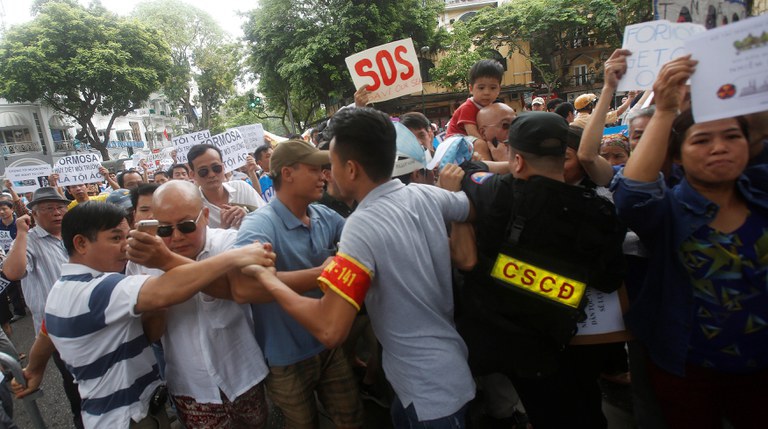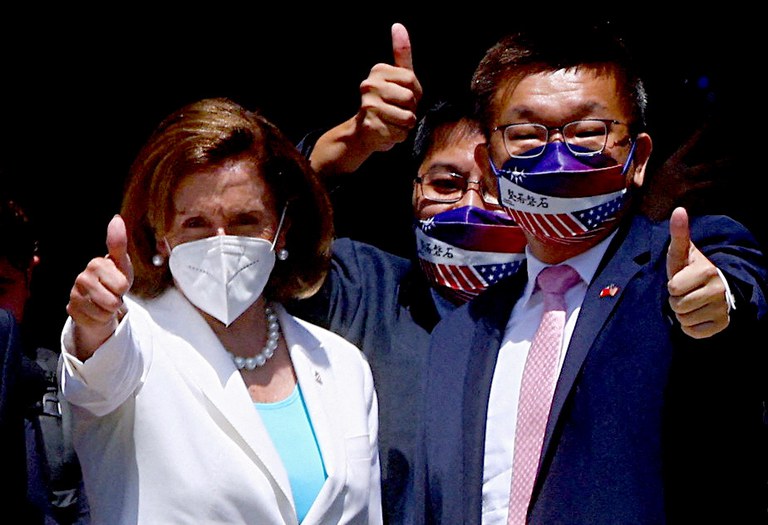
Vietnam sets up specialized police units to suppress protests across the country
More than a dozen provinces and cities in Vietnam have set up Riot Police Regiments or Battalions to be held in reserve to crack down on people accused of “disturbing public order” and carrying out “illegal demonstrations.” RFA research shows at least 15 provinces and cities had launched forces as of Oct. 10, 2021. They include Ho Chi Minh City, Binh Duong, Binh Phuoc, Dong Nai, Nghe An, Lao Cai, Bac Giang, Thanh Hoa and Gia Lai. The riot squads have been formed to crack down on worker protests at the many industrial parks in southeastern Vietnam, in places such as Ho Chi Minh City, Binh Duong, and Dong Nai. They could also be used to stop demonstrations by ethnic and religious minorities such as the Protestant Ede and Duong Van Minh sect in provinces like Cao Bang and Gia Lai. On Wednesday the Ho Chi Minh City Police held a launching ceremony for its Reserve Riot Combat Police Regiment. State media said the force was established under a ruling by the Ministry of Public Security to set up Reserve Riot Police Battalions in province-level localities. News sites did not publish the full text of the ministry’s Decision No.1984, which called for the regiment’s formation. According to the Công an Nhân dân (People’s Police) online newspaper, the regiments and battalions must be ready to fight in any situation when they receive orders from the Ministry of Public Security or directors of province-level police departments. The Ho Chi Minh City Police Department outlined the riot squad’s duties to the media. They include “preventing and suppressing cases of public disorder and illegal demonstrations,” “conducting rescue operations,” “protecting important political events of the Party and State and [maintaining order during] major holidays,” “ensuring political security, social order and safety of the locality,” and “performing other tasks as required.” Police try to stop protesters demanding clean water in Hanoi on May 1, 2016. CREDIT: Reuters Suppression of protests ‘unconstitutional’ A Ho Chi Minh City-based lawyer, who did not wish to be named for security reasons, said “suppression of unlawful protests” goes against Vietnam’s Constitution. “I think Vietnam doesn’t yet have a Law on Protests, so it can’t be said that demonstrations are illegal,” the lawyer said. “The right to protest is a constitutional right, so repression is unconstitutional.” “The Vietnamese state does not mention a Law on Protests, perhaps because it does not want to because it is afraid people will protest [against it].” A woman, who asked only to be named as Phung, participated in protests against China’s placement of the HD981 oil rig in Vietnam’s Exclusive Economic Zone in 2014. She told RFA the government has been suspending the Bill on Protests for too long. “According to the Vietnamese Constitution, people have the right to protest, but the bill on demonstrations has been frozen for many years,” she said. “Basically, in Vietnam, every protest is suppressed, because they have not passed a bill which would allow people to ask for permission to organize demonstrations like in other countries.” “Article 25 of the 2013 Constitution stipulates that ‘Citizens have the right to freedom of speech, freedom of the press, access to information, assembly, association, and demonstration.’ The exercise of these rights is prescribed by law.” Government drags its heels on protest law In 2013, the government directed the Ministry of Public Security to take primary responsibility and coordinate with relevant agencies to develop a draft Law on Protests. The bill has been repeatedly withdrawn from the National Assembly’s agenda for further study and amendment. In 2017, national legislator Truong Trong Nghia, from Ho Chi Minh City, told the National Assembly that the promulgation of a Law on Protests was necessary in order to implement the 2013 Constitution on ensuring human and citizens’ rights. Since 2018, no National Assembly member or domestic newspaper has mentioned the Bill on Protests. Strengthening the suppression of resistance According to Hanoi-based journalist Nguyen Vu Binh, in Vietnam what is written in the Constitution is one thing, how it is implemented is another. Binh said the establishment of a specialized agency and riot police force is intended to quell all resistance by the people and comes after a series of fierce crackdowns on protests. “Following the trend of increasing repression in the past four-to-five years, the professionalization of these forces to suppress protests and people’s resistance is normal in my opinion,” Binh said. Oil rig protester Phung told RFA the repression and suppression of protests has always taken place in Vietnam. She said Vietnam does not need to sign any more international agreements so the government is not interested in respecting human rights. “At this stage Vietnam does not need to join any treaty or agreement, so they want to deal with [whichever protest] they want. Now they are also bolder,” she said. “I believe that even if a force is formed, they will not use uniformed forces to take action to suppress protesters because that will affect the image of the Vietnamese government. They don’t want to show their true face to the world.” Human Rights Watch’s latest report on Vietnam, published in February, said: “fundamental civil and political rights are systematically suppressed in Vietnam. The government, under the one-party rule of the Communist Party of Vietnam, tightened its grip on the rights to freedom of expression, freedom of association, peaceful assembly, freedom of movement, and freedom of religion.”







